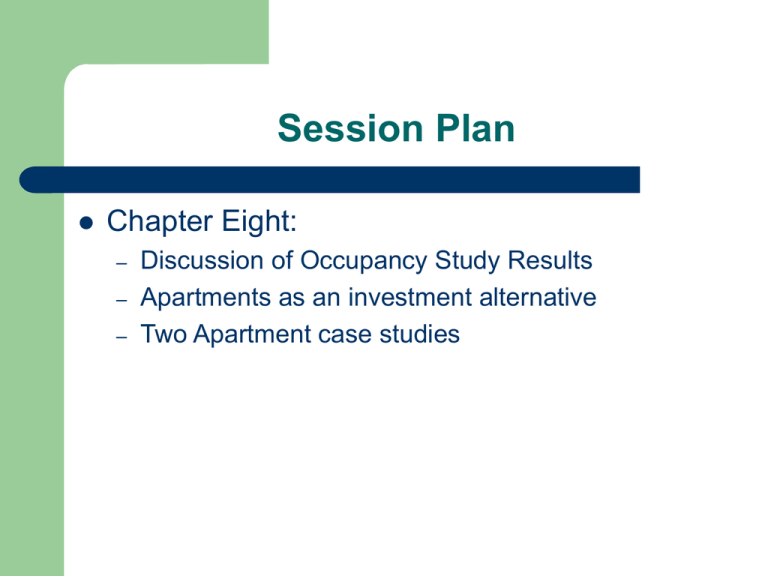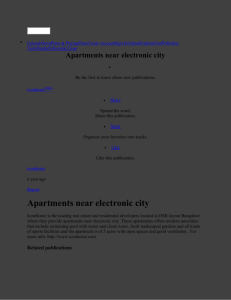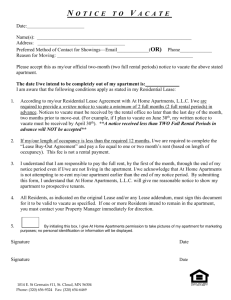Session Plan Chapter Eight:
advertisement

Session Plan Chapter Eight: – – – Discussion of Occupancy Study Results Apartments as an investment alternative Two Apartment case studies The Remaining Term Now that we have covered the bulk of the textbook material, the course moves into the “real world” application phase. Numerous properties will be discussed in chapters 8-10 Format of Case Studies Each case study will contain a one or two page summary of the case data We will discuss values that you have determined for the following items: – – – – – Gross Potential Income (GPI) Effective Gross Income (EGI) Net Operating Income (NOI) Annual Debt Service & Debt Coverage Ratio Sensitivity Analysis Property Life Cycle UPSIDE/Decreasing Risk Ground Floor Stage One DOWNSIDE/Increasing Risk Loan Commitment Maturing Aging Stage Interim Stage Tenancy Absorption Process Process Two Three Four Five Six Seven Demise Eight Developer Development Period Equity Investor Holding Period Developer Redevelopment Period Property Life Cycle Pyramid (Pyrr & Cooper, 1982) Cash Flow Fundamentals Quantity How much lease income per month (historical/projected)? Comparison to market rental rates per square foot for similar properties. Quality Diversification (number of tenants) Tenant financial strength (internal information or Business Credit Report when applicable) Durability Length of leases relative to term of loan. Mgmt Experience with property (or similar properties) Review of Apartment Terms Amenities – Efficiency – An apartment without a separate bedroom Garden Unit – Special features of a particular unit (fireplace, vaulted ceilings, etc.) or of the complex as a whole (swimming pools, tennis courts, etc.) A unit all on one floor Townhouse – A unit on two floors Types of Apartments Walk-up Apartments – Mid-rise Apartments – 3 to 5 floors, patio on first floor, balcony on rest 6 to 9 stories, will have an elevator to service High-rise Apartments – General rule is one elevator for every 8 floors Typical Apartment Complexes Contain…. Signed leases with terms of one year or less Proximity to places of employment, shopping centers, churches, schools, and public transportation Should be located in a residential area Proximity to parks, lakes, etc. is desirable Should not be located too close to industrial facilities Should have adequate amount of parking Quality of Construction A brick exterior is typically more desirable than a wood or other exterior Washer & Dryer hook-ups are a plus – Central Air Conditioning is desirable – If not need access to laundry facilities As opposed to window a/c units Condition of roof, siding, entrances, parking lot etc. affect the effective age of the property Interior quality also affects desirability Standard Vs. Luxury Apts. Luxury units are typically newer and of much higher quality than lower priced units As a general rule, the luxury apartments do not compete with standard apartments Typically, the more amenities in a property, the higher the rent per square foot Should always consider the supply and demand of COMPETING units when deciding on the viability of an apartment project Replacement Reserve The direct capitalization spreadsheet contains one expense item that will not be given to you; replacement reserve. This is an estimate of items which will need to be replaced each year – – – – Like roof, structural repairs, HVAC, appliances, etc. Varies depending on age and condition of the property Apartments: From $100 to $250 per unit Office/Retail/Industrial: From 1-3% of EGI Investors used to have to place this amount of money in an escrow account each year – Now most lenders look to make sure investor has cash on hand in case something goes bump in the night! The Higher the Better? Typically apartments higher than two floors will have an elevator – – In many areas of the country this is required. If an elevator exists, should always inquire about its age and condition. If a subject property has a third floor with stair access, it may be harder to lease those units – How might you try to get those units leased? Off-Campus Student Housing Too Old – Too Late – Get them ready in time for Fall semester…or else! Too New – Newer properties have better amenities Last one to market in saturated environment Too Broad – Caters to students and the general public Off-Campus Student Housing Market Study Supply: – – – – Focus on just student apartments May need to include rental houses Contact university officials for on campus units Contact regional/city officials for future construction plans Demand: – – – Total enrollment minus on-campus and commuters Contact University officials for on-campus projections Contact appraiser if need occupancy study (good for approx. one year) Results of Off-Campus Occupancy Study Overall Current Market Vacancy: __% Three Year Average Vacancy: __% Rent per Square Foot: $____ Average Monthly Rental Rate: $___ Average Monthly Rent per Bed: $____ Average Age of Complex: ____ years old ____ Different Apartment Complexes Surveyed – A Total of ____ apartment units! We will use these to compare our case studies to see if the rental rates are within the market averages…. Your Role as Lender Congratulations! You are now employed as a senior commercial lender at a large commercial bank!! – Hopefully a solvent one! As you will be looking at these investments from the perspective of a lender, it will be helpful to get familiar with your lending guidelines. I will provide you the lending criteria (loan amount, interest rate, amortization period, cap rate), you will do the rest! End Apartment Slide Session

